In Abruzzo, Italy, lies a small village by the name of Anversa degli Abruzzi. And when I say small, I mean it—just over 300 people inhabit the mountainside town overlooking the Saggitario Gorge. Livestock roams in the mountains of this eye-catching denomination.
A family in this village—the Marcellis—herd sheep and goats for the purpose of making farmstead cheeses. Their farm, La Porta dei Parchi, has been in existence for 45 years and is sought out in the region as a pillar of sustainable and ethical agriculture. Many of these cheeses are quite unique, using raw milk from ancient breeds of livestock that feed on mountain grass and herbs specific to the area. This, combined with the expertise of a family who eats, sleeps and breathes cheesemaking, creates varieties of cheese that differ heavily from anything made here in the States. Simply put, these cheeses are nothing like anything you have ever had.
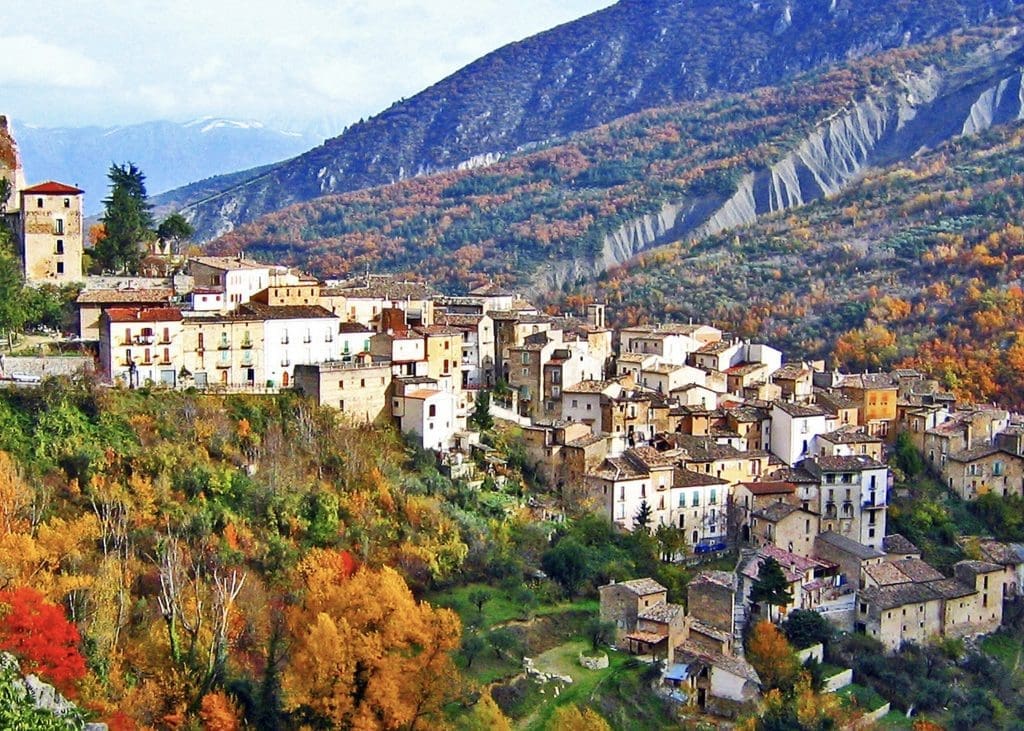
4,300 miles from Abruzzo in Clifton, New Jersey, lies another set of Marcellis. Their job? Importing and distributing their extended family’s expertly-crafted products. This is the story of how Marcelli Formaggi—a transatlantic family business—came to be.
I first met Tina Marcelli of Marcelli Formaggi back in 2019 when I was working as a server. She was a guest and, unbeknownst to me, the provider of several of our cheeses that evening. One of the pastas on our menu contained an imported cheese from Abruzzo that I very elegantly pitched to her. She started laughing. “I sold that cheese to you guys,” she said, “that’s my family’s cheese!”
I was a little bit embarrassed, but Tina listened to me spiel the entire thing with a smile before revealing to me that she knew more about it than I ever could. Her eyes light up at the story of her family’s products—no matter how many times she’s heard or told it. And for years, I had heard bits and pieces of the full story, but it wasn’t until recently that Tina sat me down and gave me the entire history of Marcelli Formaggi, complete with a cheese tasting that covered a variety of their catalog.
The first thing Tina made certain I knew was that Marcelli Formaggi is a family business in every sense of the phrase. Her ancestors have lived in Anversa degli Abruzzi for over 500 years and potentially even longer. Obviously, over the centuries, some stayed put and others made the long trek to America. “It’s a family,” Tina told me, “It’s a proud time [for us].”
From the inception of the business to now, that sentiment has never wrinkled.
It started almost 15 years ago when the “American Marcellis,” as Tina calls them, took a trip to the village where her family was from. For nearly all of them, it was their first time setting foot in the motherland. It was also the first time any of them would meet their Italian family—Italian Marcellis. What they didn’t know was that for some of them, this was the start of something much larger than a family vacation.
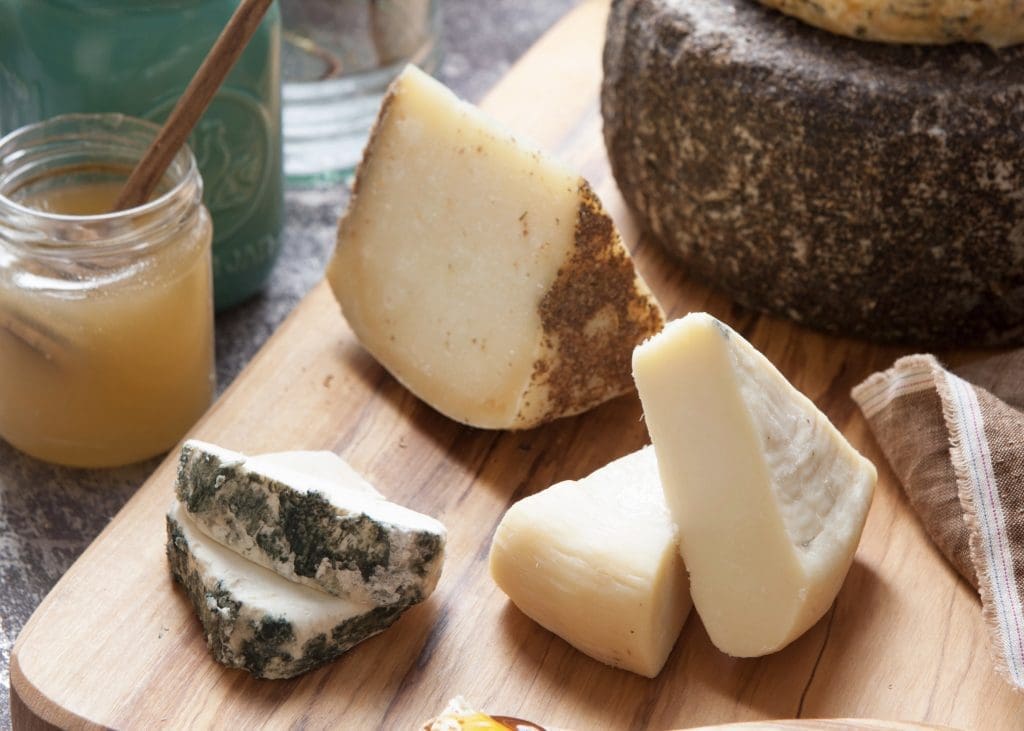
Prior to the visit, Tina and her immediate family were completely oblivious to what their Italian relatives did in Abruzzo. Upon meeting, they sat down for a meal and Nunzio Marcelli—a newly discovered relative and cousin of Tina’s father, Bob—put down a cheese board for the visitors to feast on. “I thought he might have bought it for us, which was nice,” Tina told me. But it was actually cheese that he made. Right there in the village. The family was instantly enamored by the quality of the cheese, which tasted nothing like even the highest quality cheeses in the US. The flavor of fresh sheep’s milk was incredibly present in any of the pecorino cheeses and fresh goat cheeses tasted of the terroir of the mountainside.
Nunzio’s cheeses are what’s known as farmstead cheese—simply meaning he makes the cheese with the milk from the animals raised on the farm. It’s a hyperlocal production and thus, one that is bursting with terroir. Additionally, because the Marcellis don’t raise cows in the mountains, they also carry cow’s milk cheeses that they purchase from local farms in Abruzzo. The farms work together as a collective. This creates a well-rounded and complex catalog filled with cheeses from several different animals presented in several different ways—each one unlike anything found in the States.
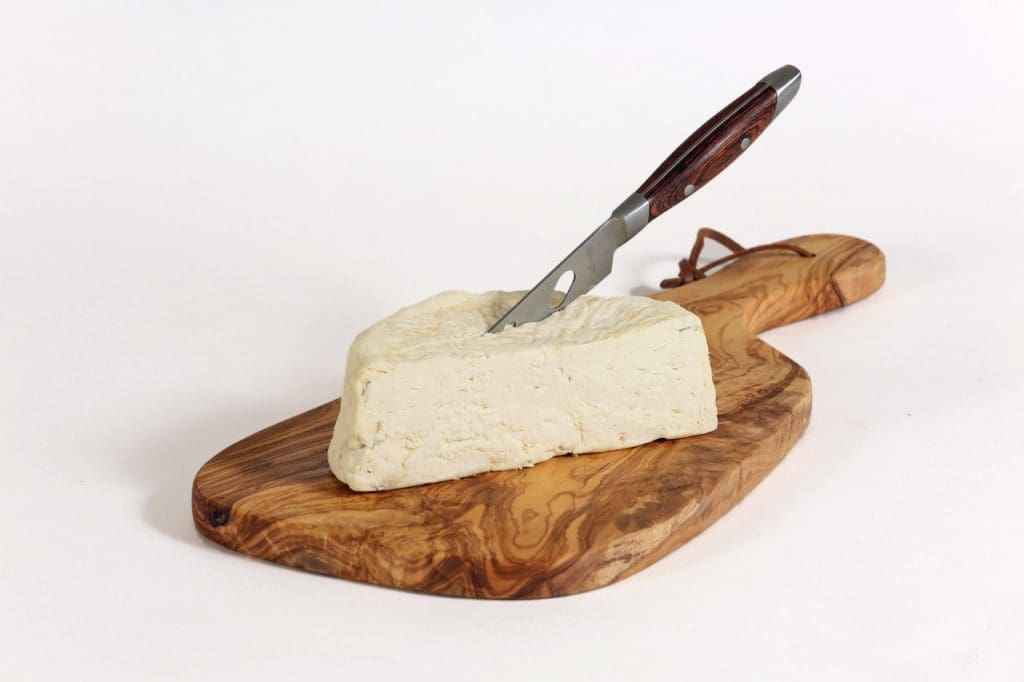
After tasting the cheese for the first time, the wheels already began turning. When Tina and her immediate family returned home, they were already asking themselves how the connection with their Italian family could remain. Tina’s father, Bob, in particular, began to brainstorm ways to bring this product to America. Still, there was some time to go before the Marcelli Formaggi that we know today came to be.
Bob—a highly lauded chef—felt that as industry people, they could turn this craft into something larger. They already knew the restaurant life and Bob knew what restaurants looked for and which products were particularly enticing to a chef’s eye. So, he began to slowly develop Marcelli Formaggi. His son Andy was the first family member to jump aboard and helped Bob to launch Marcelli Formaggi off the ground. Andy worked with the brand until taking a job at the newly opened Eataly in flatiron. Tina was also working in NYC restaurants at the time as a pastry chef. But, soon, they would both put down their chef’s knives in exchange for cheese knives.
By 2014, it was a full-blown family affair. Tina and her mom Emily joined Bob and Andy returned to the company soon thereafter.
This was a family of food-minded people. Both their love for food and their ancestral roots found them seeking to create something that not only pleased the masses but told their family’s story. Nunzio Marcelli’s craft was special, and the Marcellis knew it. But now more people would get to learn about it. More importantly, more people would have the pleasure of tasting his farmstead cheeses.
It took some time to convince their Italian counterparts, but in 2007 a business plan was formed and the early stages of Marcelli Formaggi began to take off.
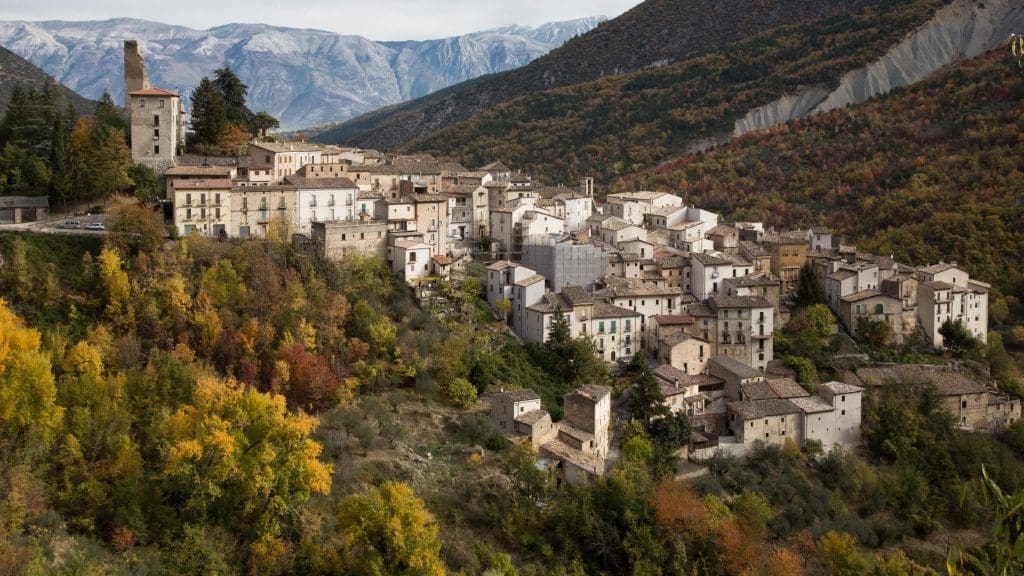
It didn’t take long for chefs in New Jersey and New York to discover Marcelli Formaggi. Acclaimed chef Marc Forgione , a longtime family friend and very first customer in NYC, began using their products and from there, it snowballed. “The first time I tasted one of Marcelli’s cheeses, I closed my eyes and could almost see the sheep grazing on the hills at the farm and [could] smell the Abruzzo air,” says Forgione of Marcelli’s products.
Similarly, on this side of the river, New Jersey chefs have taken a liking to the Marcelli Formaggi way over the last half-decade. Chef Robbie Felice of Pasta Ramen, Viaggio and Osteria Crescendo has long been a proponent of Marcelli’s catalog, utilizing the Abruzzese cheeses in an array of dishes. At Mike’s Pasta Shoppe in East Rutherford, NJ, you can find Marcelli imported cheeses, pastas, olive oils and more. Tina noted that acclaimed Montclair chef, Mike Carrino was the first Jersey restaurant to purchase the Marcelli’s cheese.
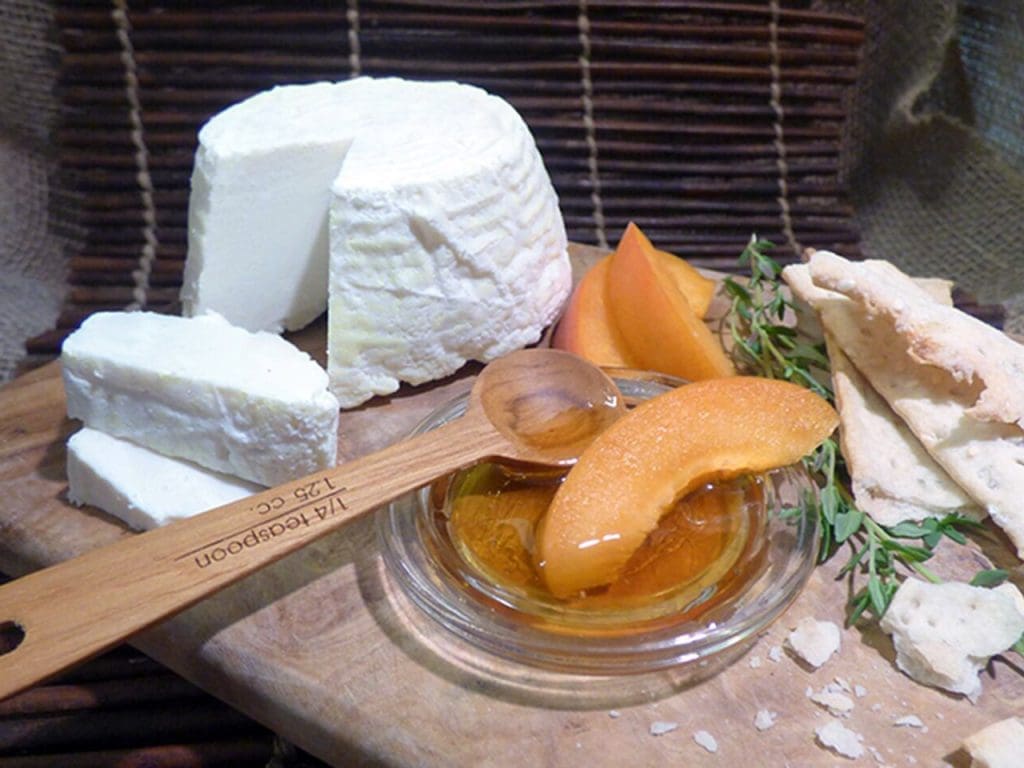
“We are a choice [to use] and we value every single restaurant and customer that chooses us,” Tina told me.
As far as cheese goes, it simply doesn’t get better than Marcelli Formaggi. Today, Nunzio’s daughter Viola Marcelli runs the farm and serves as the primary cheesemaker. Their line of products covers a variety of styles and flavors, providing a cheese for everyone. The Ricotta al Fumo di Ginepro, for example, is a two-month-aged sheep’s milk cheese that is smoked with juniper. It’s creamy, with a slight bite and a profound smoky flavor on the back of your palate. Additionally, it is made just steps from the mountains that the sheep graze on. According to Tina, they can’t import enough of this cheese—it always sells fast.
The Ricotta Peperoncino starts with an identical process, but instead of being smoked with juniper, it is rubbed with crushed Calabrian chilis and then allowed to age. The bright red outer portion of the cheese is noticeably spicy, while the inside retains a bone-white color and the flavor of raw sheep’s milk. This creates a cheese that is inarguably well-balanced and totally unlike anything I have ever tasted.
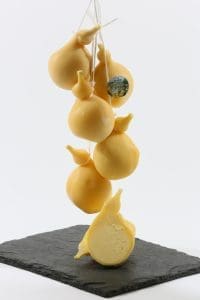
And though there are no cows on the Marcelli farm, that doesn’t stop Nunzio and Viola from bringing in cow’s milk cheese from the area. The Manteca Caciocavallo Podolico in particular, is one of the most special products I have ever had the pleasure of tasting. Made in Abruzzo by the nicknamed ‘Last Cowgirl’ Carmelina Colantuano using milk Podolico Cow, Caciocavallo is hand-stretched around a ball of fresh butter, creating an air-tight seal that preserves the butter inside. It is then aged for at least 3 months. The outer rind tastes and looks like cheese, while the inside shows off a bright yellow-hued butter. The butter is so fresh tasting that Tina could have told me it was churned yesterday and I would have no reason not to believe her.
Though it started with farmstead cheeses, Marcelli Formaggi has evolved into an importer of many Abruzzese products that extend well beyond dairy. Honey made by Luca Finnochio is one product in particular that Tina’s pride for was impossible to hide. “I always carry a sample jar of this honey in my purse,” she told me.
This honey is especially interesting because the bees pollinate the same flowers that Marcelli’s sheep and goats graze on. Like the cheese before it, the mountainside terroir is undeniable. Furthermore, when combined with any of the Marcelli cheeses, a purely Abruzzese bite of food is formed. For Tina and her family, there is nothing more satisfying than that.
Additionally, bronze-cut pastas, gluten-free pasta that is indistinguishable from its glutenous counterpart, tomato sauce and more are brought to the states via Marcelli Formaggi. One product in particular, though, has earned the Marcelli business as much praise as the cheese: Olio Fresco.
The Olio Fresco is one of the freshest-tasting olive oils on the market. Olives are grown in Abruzzo and allowed to ripen on the tree until the last possible second in order to achieve maximum ripeness and flavor. They are then immediately pressed, going from branch to bottle in under 48 hours. Once bottled, Marcelli Formaggi flies the olive oil to the US to ensure peak flavor and maximum freshness when it hits the shelves. The passion for creating the best possible olive oil starts with the olive trees themselves, but the dedication extends all the way through to the shipping process. With other oils, downtime between bottling and shipping, or picking the fruit before it’s fully ready leads to lackluster oils. On the other hand, Olio Fresco is bright green in color with a fruit-forward flavor, buttery texture and tinge of spice on the back end. It is without a doubt one of the most profound olive oils I have ever had. “Yep, I carry this in my purse too,” Tina said, laughing.
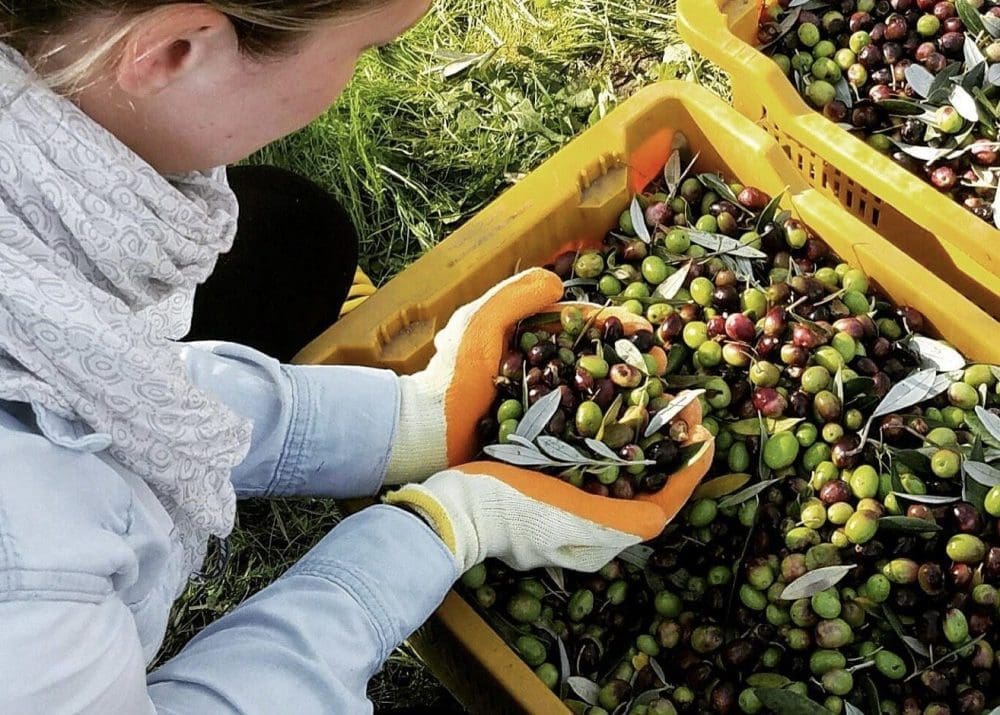
Any of these products can be purchased on their website. Additionally, wholesale is a large part of their business, providing restaurants and stores with large quantities of their goods.
If Marcelli Formaggi’s only mission was to import excellent products from Abruzzo, they would no doubt still be successful, but it is the mission to empower their Italian family and tell the story of their ancestry that makes it more than just a business. When I walked into Marcelli Formaggi’s warehouse in Clifton, I was greeted not only by Tina, but by her mother, Emily, and father Bob as well. Tina made certain I understood that without family, the business would crumble. It is impossible to ignore the family pride that goes into this operation.
The Marcelli’s regularly visit Anversa degli Abruzzi to taste products and hangout with their Italian counterparts. Tina even laughed when she told me she was flying to Italy in less than 15 hours to do just that.
It is a business that starts with excellent products, but it is the pride and family love that catapults Marcelli Formaggi into something larger. Beyond cheese, pasta and olive oil is a story of an American family retracing their roots and discovering something incredible—closing a 4,300-mile gap that extends across the Atlantic Ocean in the process. That alone is enough to make Marcelli Formaggi one of New Jersey’s greatest success stories.


